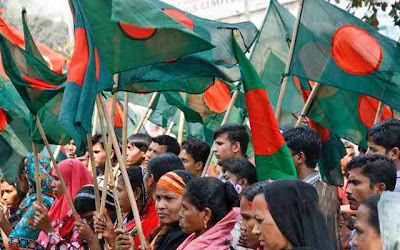BANGLADESH NEWS
The organisers of the youth uprising are
drumming up support for their demand of execution of all war criminals and a ban
on Jamaat-e-Islami for war crimes.
Shahbagh came under spotlight on Feb 5
when a few youths, convened by Blogger and Online Activist Network, took to the
streets at the intersection protesting against what they said ‘lenient sentence’
against war crime convict Abdul Quader Molla.
The protest drew support
from people of all walks of life spreading across the country, with Ganajagaran
Mancha replicated in different districts and divisions.
The decision to
hold rally at Laldighi Maidan in Chittagong came following over a month-long
protest in the capital.
During the period the protesters held six rallies
in different parts of the capital with the last one taking place at the
Suhrawardi Uddyan on Mar 7.
Ganajagaran Mancha spokesperson Imran H
Sarker announced the new protest programmes after the Narijagaran Rally that
ended successfully even after two bomb explosions near the stage at around 5pm
on Friday.
He urged all education institutions across the country to
organise rallies on Mar 16 in support of the Mancha.
It was announced
that the next rally of the Mancha would be organised on Mar 10 at the
intersection at Uttara 11 number sector, followed by rallies in Chittagong and
Ashulia on Mar 13 and 15 respectively.
The Chittagong rally will be
followed by another rally at Chittagong University in the morning the same
day.
Friday’s Nari Jagaran rally started with rendering of the national
anthem at around 4:30pm. It was organised to commemorate those women who were
tortured and killed during the Liberation War in 1971.
The explosions
took place about 15 minutes later. Organisers chanted slogan “Joy Bangla” to
allay fear and requested participants not to leave their position. The rally
continued uninterrupted.
Transparency International, Bangladesh
Chairperson Sultana Kamal was on the stage at the time the explosion
occurred.
“It is not unexpected that bombs will be hurled at us. Those
who were against the country’s Independence carried out such acts earlier, and
will continue performing their acts. It will not be able to stop our movement,”
Kamal said immediately after the explosions.
People irrespective of their
professional identities and class began thronging the venue since 1pm in
processions.
Children came in large numbers with their mothers or
sisters.
Women of different ages carried banners, festoons, and placards
to join the rally. Many of them used headbands to demand death to all war
criminals.
The venue was full to the brim by 3pm.
A photography
exhibition themed woman in protest and struggles was also organised near the
venue.
Foreign Minister Dipu Moni and Sculptor Ferdousi Priyobhasini were
present during the rally.
Moni stayed there for 40 minutes. While leaving
she told journalists the spirit of the Independence War was to build a society
free of any discrimination.
“The spirit has been resurrected by the young
generation. The spirit of Ganajagaran is the spirit of ’71.”
“The
Ganajagaran of the young generation has brought back our valour. Hanging war
criminals may give women some solace for the assault they underwent during
1971,” said Priyobhasini, a freedom fighter.
The rally concluded by all
making an oath that they would not return home until all war criminals were
hanged. Imran administered the oath from the stage erected for the
programme.
Several thousands participants promised that they would
boycott all financial, social and cultural organisations tied to the war
criminals. They also pledged to boycott the media owned by people patronising
the war criminals and their activities.
Imran reminded all that women
repressors of the 1971 were yet to be brought to book.
“We announce our
firm commitment that we will fight for ensuring the highest punishment to the
war criminals who had handed our mother-sister to the Pakistan army. Our
movement will continue until our six demands are met. At the same time we will
take care of all types of discrimination against women.”
Thousands of the
participants stood in silence for a minute to honour Tanvir Mohammad Twaki. Son
of Narayanganj Ganajagaran Mancha unit organiser Rafiur Rabbi, Twaki was gagged
to death before his body being dumped in Shitalakkhya river in Narayanganj. His
body was found on Friday, two days after he had gone missing.
Lukcy
Akter, who rose to prominence for her fiery voice chanting anti-war criminal
slogan, urged BNP Chairperson Khaleda Zia to come and join their
movement.
“This movement does not belong to any political party. This
stage has been built to demand that all war criminals be hanged.”
Dhaka
University’s Chhatra Federation unit’s President Samiya Rahman said reactionary
forces always pushed women backwards the moment they took to the streets
demanding equal rights.
JSD Chhatra League Member Shrabanti Akter
wondered how the opposition leader, being the wife of a freedom fighter, could
side with war criminals when people were out on the street for justice against
war crimes.
“Leave Razakar’s company and stand by the side of
Ganajagaran. Stand with the people.”
Samajtantrik Chhatra Front's Eden
College unit General Secretary Mukta Baroi remembered those women who sacrificed
their lives for an independent Bangladesh.
Wasfia Nazreen, who scaled
Everest as the second Bangladeshi woman, welcomed the women for participating in
the rally overcoming all obstacles and fearsome propaganda.
Chhatra
Moitry’s Vice President Anima Sultana Shaon demanded that those who tore the
national flag and demolished Shaheed Minar recently be identified, and their
citizenship be revoked.
Former DUCSU VP Sharmin Sultana Lipi and
prominent actor Ferdousi Majumder also spoke among
others.








